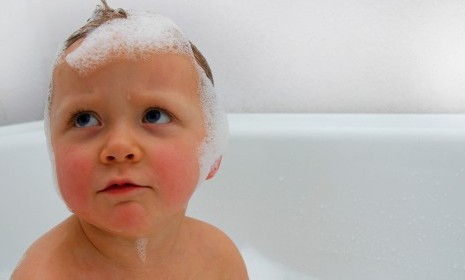Is your baby too germ-free?
Scientists say the over-sanitized environments of children in developed countries like the U.S. could actually cause more harm than good

A free daily email with the biggest news stories of the day – and the best features from TheWeek.com
You are now subscribed
Your newsletter sign-up was successful
The newly released film Babies, which follows four infants living in different countries around the world, has reignited an age-old question: Does a little dirt do a baby good? In the film, Ponijao, a tot from Nambia, drinks muddy water and chews on bones. Bayar, from Mongolia, bathes in the drinking water of a goat — all of which is terribly unhygienic compared with the environments of their First World counterparts. While experts don't suggest letting your child play in a dirty river, new research shows that exposure to bacteria may improve the development of a person's immune system, and help fend off disease. Following, a quick guide to why germs and grime might actually be good for our newborns:
What makes experts think sanitary conditions are harmful?
While countries with squalid living environments have much higher childhood death rates from diseases like pneumonia and malaria, upscale infants are more prone to develop an array of other serious health problems, including asthma, allergies, diabetes, and multiple sclerosis. These and a wide variety of other health issues didn't exist in the United States before the 20th century, when living conditions were far less sanitary. "We seem to be healthier," Tufts Medical Center researcher Dr. Joel Weinstock tells The Wall Street Journal, "but we have traded one problem for another problem."
The Week
Escape your echo chamber. Get the facts behind the news, plus analysis from multiple perspectives.

Sign up for The Week's Free Newsletters
From our morning news briefing to a weekly Good News Newsletter, get the best of The Week delivered directly to your inbox.
From our morning news briefing to a weekly Good News Newsletter, get the best of The Week delivered directly to your inbox.
Why do germs help fend off disease?
Exposure to bacteria, viruses, and other microorganisms early in life helps a child's immune system develop the proper defenses against disease, experts say. When people shielded from grime as babies are exposed later in life, their immune systems are unprepared, leaving their bodies vulnerable to various illnesses. Frequently their systems overcompensate by developing allergies to such things as food, pollen, and animals.
What can parents do to help their children's immune systems develop?
Avoid overuse of products like hand-sanitizers, disinfectants, and air-filtering devices, which kill off the good germs along with the bad. Plus, "there's nothing wrong with kids playing in the dirt," says Dr. Weinstock. "They don't have to live in total sanitation, and they won't die from eating something off the floor. It's probably more healthy than not."
A free daily email with the biggest news stories of the day – and the best features from TheWeek.com
Sources: Wall Street Journal, Science Daily
-
 Film reviews: ‘Wuthering Heights,’ ‘Good Luck, Have Fun, Don’t Die,’ and ‘Sirat’
Film reviews: ‘Wuthering Heights,’ ‘Good Luck, Have Fun, Don’t Die,’ and ‘Sirat’Feature An inconvenient love torments a would-be couple, a gonzo time traveler seeks to save humanity from AI, and a father’s desperate search goes deeply sideways
-
 Political cartoons for February 16
Political cartoons for February 16Cartoons Monday’s political cartoons include President's Day, a valentine from the Epstein files, and more
-
 Regent Hong Kong: a tranquil haven with a prime waterfront spot
Regent Hong Kong: a tranquil haven with a prime waterfront spotThe Week Recommends The trendy hotel recently underwent an extensive two-year revamp